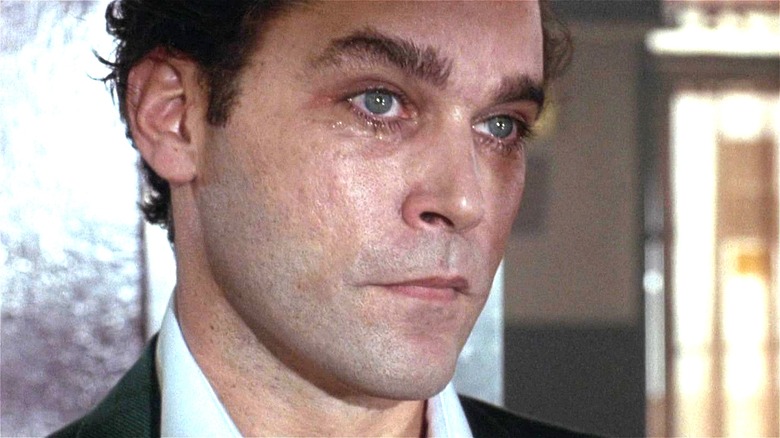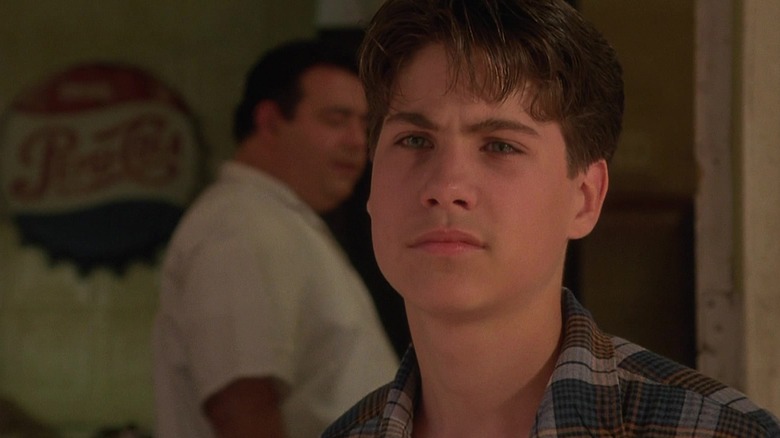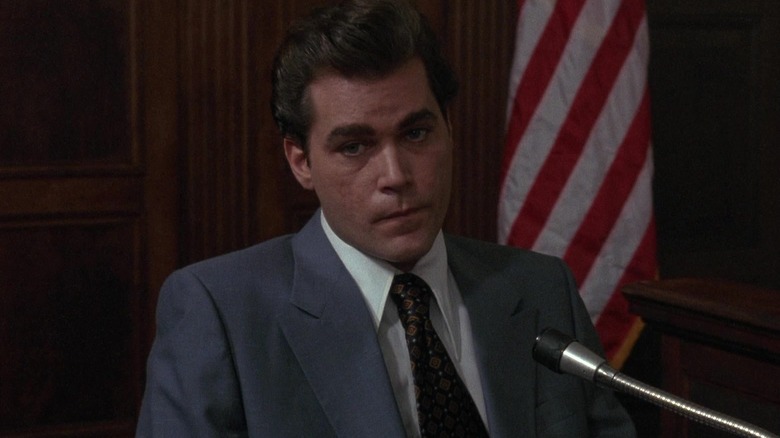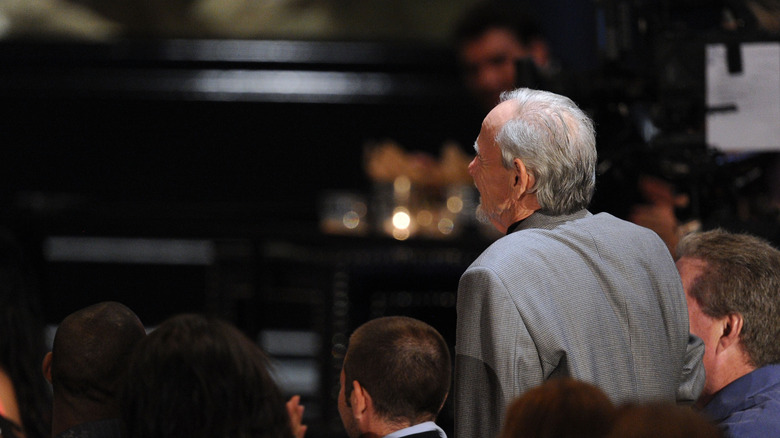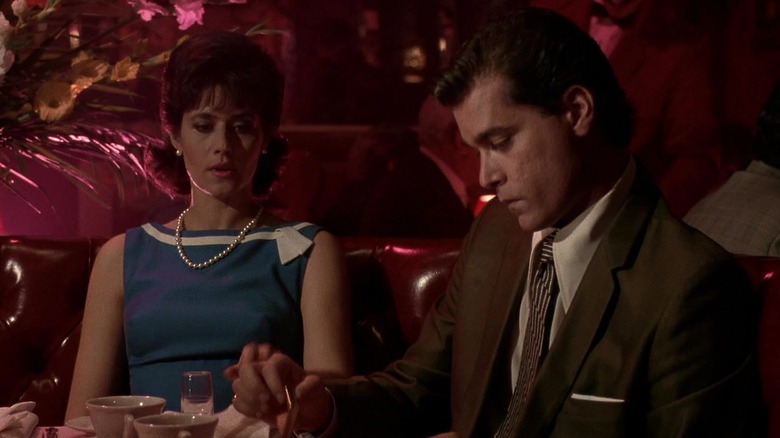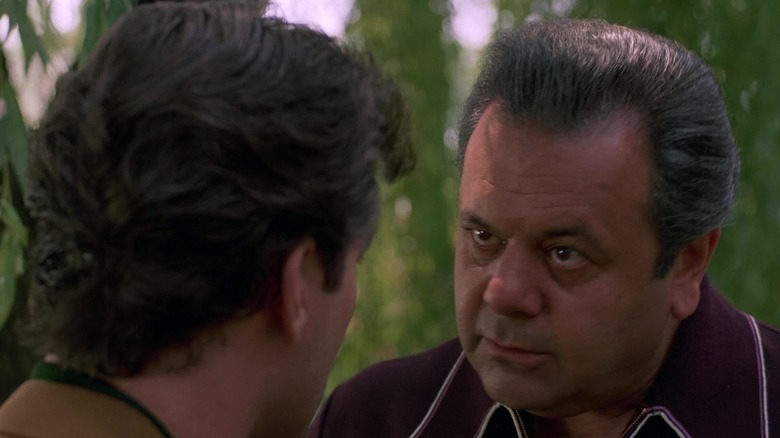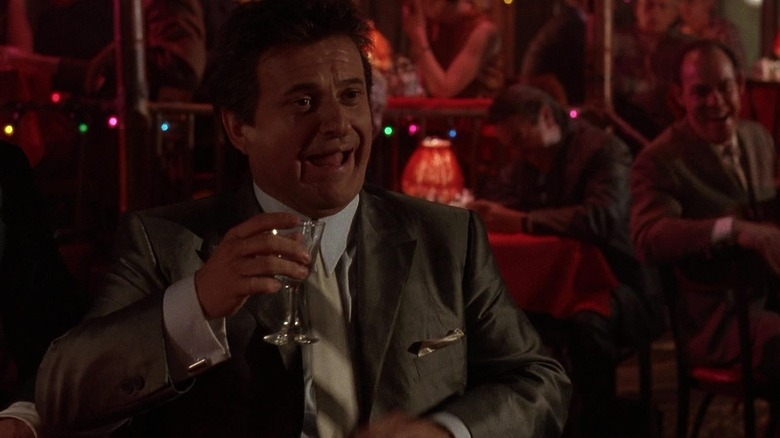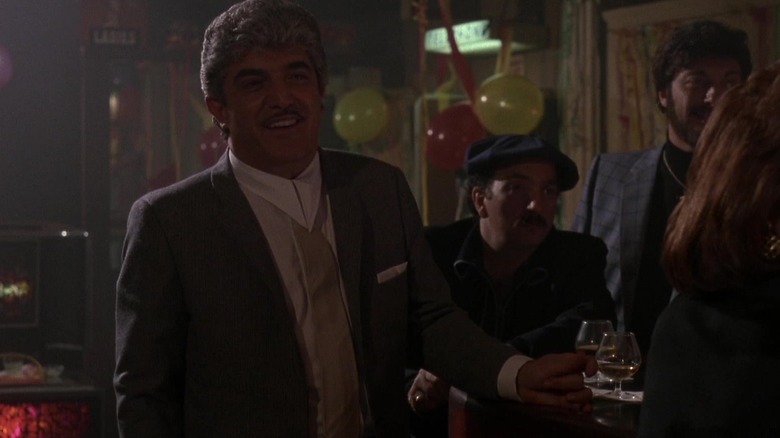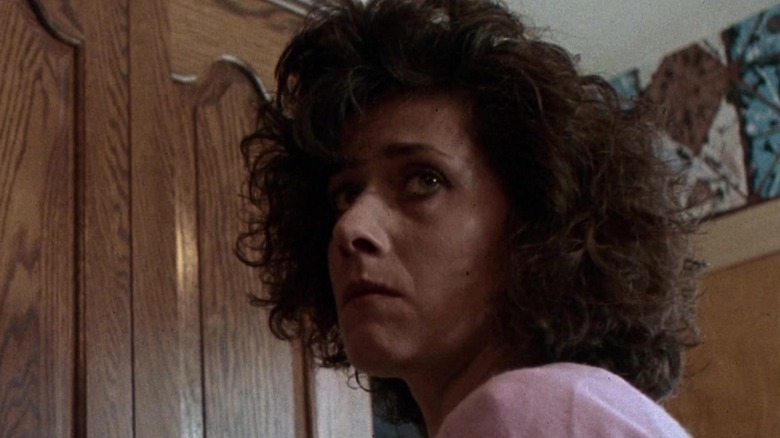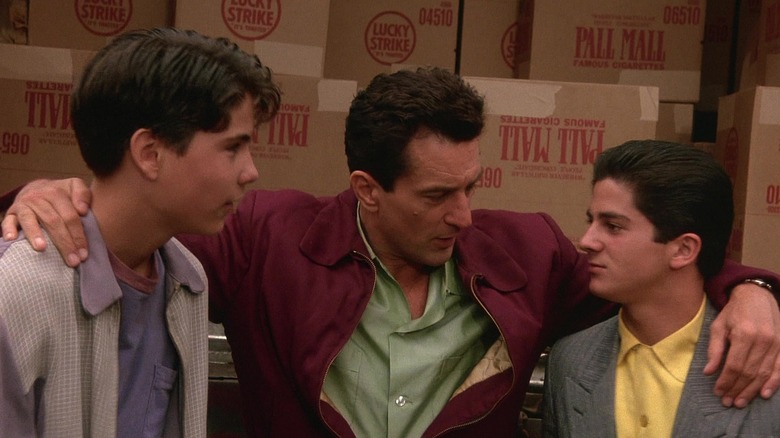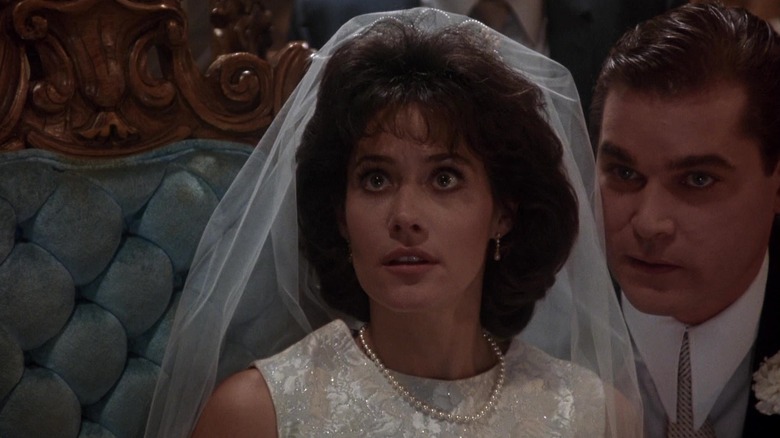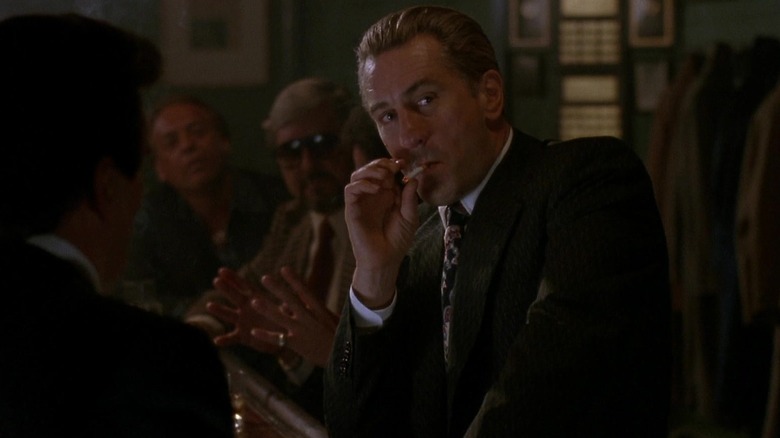Everything Goodfellas Doesn't Tell You About The True Story
"Goodfellas" is not only considered one of the best gangster movies of all time, but it's also considered one of the best Martin Scorcese movies. It paints a portrait of the mafia life as equal parts romantic and hectic. It marries great music with such legendary tracking shots as the one following Henry (Ray Liotta) and Karen (Lorraine Bracco) from the street into their seat front and center at the Copa. Aside from Scorcese and the great cast, one of the draws to the story is the fact that it's based pretty closely on the life of a real gangster: Henry Hill.
For those who don't know, Henry Hill was a real person, and "Goodfellas" is based on Nicholas Pileggi's book about Hill, "Wiseguy". Hill grew up in a working-class part of Brooklyn, figured out early on he'd rather be a gangster "than the president of the United States," and never looked back. Until he had to look back, and over his shoulder, and everywhere else to keep from sleeping with the fishes. Hill landed in witness protection, but that didn't stop him from telling Pileggi his story. In turn, Pileggi gave the world an insider look at "the life." Ironically, the reality was even crazier than the film.
There was a lot of story in "Wiseguy," so much one can only assume that's why Scorcese left out some big plot points (though the story behind the movie itself is also pretty wild). As crazy as "Goodfellas" may be, the film doesn't even come close to the bottom of the rabbit hole. And the details Scorcese left out of the film could make their own movie.
Henry Hill was in the military
In "Goodfellas," Henry Hill goes from life as a kid on the street to a full-fledged gangster. In real life, Hill took a little break from life on the streets. He briefly pursued a life as a member of the U.S. Military. According to military community publication We Are the Mighty, Hill joined the 82nd Airborne at age 17. The article mentions how "Wiseguy" explains Hill had joined the military as a way to escape a senate probe into union connections to organized crime. It also mentions how he used his time in there to continue his criminal activities. In "Goodfellas," we see Hill selling stolen cigarettes, tax-free. The article mentions how he sold tax-free cigarettes while in the military.
The article also mentions how he had been a loan shark in the military too. And got in plenty of fights. After the last time he was released from the military clink (again for stealing and fighting), his enlistment time was up, so Hill returned to the Lucchese family and became a different type of soldier. Whether he ever really intended to join the military or it was just another con, he briefly served the government that eventually brought him down. It seems that Henry Hill in real life, as in "Goodfellas," was a study in contradictions with some pretty great and some pretty poor moments.
The 1979 Boston College Eagles brought down the mafia
Henry Hill was involved in a lot of schemes with the Lucchese family. Ironically, one of the biggest ones, and the one which really brought him and some of his closest associates down, was a point-shaving scheme with the 1978–79 Boston College basketball team. This is one of the stories that transcends "Goodfellas." Some have called it the worst point-fixing scheme in sports history (via ESPN). Not only because it was so easily found out, but because it worked out so poorly for the gangsters.
Stories differ across the board. Some players say the scheme never took place beyond some preliminary conversations. Some gangster gamblers say they had multiple players in their pockets. In terms of the payout, some gangsters claimed to have raked in hundreds of thousands, while others say they didn't score past a few thousand. Nevertheless, the scheme accomplished one goal: It brought down Jimmy Burke aka Jimmy Conway (Robert de Niro) in "Goodfellas" (per OTB Sports). Henry Hill's testimony about Burke's involvement in this half-baked scheme is what finally got Jimmy "The Gent" behind bars.
He was a bad fella for witness protection
"Goodfellas" ends with Henry Hill in witness protection living his life as "just another schnook." He's in a suburban house, living that domesticated life a young Hill had joined the mafia to escape. Luckily for Hill, though, he wouldn't live his life as an average suburbanite under a false identity. Luckily he also wasn't being actively hunted by the mafia, either. He was kicked out of hiding due to some questionable moves on the part of the former gangster and current snitch himself. Henry Hill wasn't too good a fella after all, at least according to witness protection.
"He was expelled from [witness protection] in 1987 for reckless behavior that included drug possession," reads his New York Times obituary. He also committed bigamy and revealed his identity often. Which means he basically snitched on himself, just to a different set of people. Hill was never killed by the mafia, even after going public about who he really was — most of the people he feared were already in prison. He eventually died of health problems, reportedly including heart disease and other diseases from heavy cigarette use.
Karen met Henry on a double date with Vario's son
In "Goodfellas," Henry meets his eventual wife Karen on a double date with Tommy DeVito (Joe Pesci). It was just two friends with two girls, and Hill even stands up Karen on the second date. This timeline is somewhat accurate, except for the fact that Henry Hill was actually invited on a double date by Paul Vario's son, Paul Vario Jr. — in the film, this would be the son of Paul Cicero (Paul Sorvino), who is not seen in the movie.
By going on the date, Hill wasn't just doing his buddy a favor; he was helping out his boss's son. Little Paulie was trying to go on a date with a Jewish girl who refused to go on a date without it being a double date — so of course, who does he call up but one of his fellow wiseguys? The rest of the early courtship plays out the same in real life as it does in the movie. That includes Karen arriving at the cabstand (driven by Paul, not Tommy) and giving Hill a firm talking-to for standing her up. The result is the same. But the setup, being on a date with your boss's son's date's friend vs. your friend's date's friend, is quite a difference.
Karen allegedly was sleeping with Paul Vario
Paulie Cicero seems relatively "moral" compared to the other madcap gangsters in "Goodfellas." Yet he has one line that goes beyond the script. Paul says to Henry Hill, "I know how to talk to her, especially to her," when convincing Henry to go back to a wife who's blowing up about his infidelities and turning into a loose cannon. The "especially to her" line seems strange unless you take it to mean that Paulie has a special relationship with Karen.
In Hill's book "Gangsters and Goodfellas: The Mob, Witness Protection, and Life on the Run," he writes that Karen had an affair with Paul Vario, Cicero's real-life counterpart, while Henry was in prison. It makes sense given how tough it was for Karen to keep afloat while Henry was in jail, as shown in the movie. Yet this goes even deeper: Henry's acceptance at the time of Vario's affair with Karen shows how respected and powerful Vario really was. And this also makes the Hills' marital struggles appear even deeper.
The real-life Tommy was taller, older, and married
Joe Pesci's Tommy DeVito in "Goodfellas" was a perpetual bachelor with a violent intensity that seemed to be grounded in an inferiority complex. In real life, though, Thomas Desimone was a big man with a wife. He was also no less psychotic, though. In "Goodfellas," we see Tommy frighten his closest friends by pretending to be offended by being called funny, the epic and tense "funny how" scene (which was largely improvised on set). We also see him shoot and kill Spider (Michael Imperioli) in the film, which happened in real life according to accounts: In "Wiseguy," Henry Hill also details how Tommy DeSimone, at just 17, was walking with Hill when he decided to show off by shooting and killing a random man in cold blood.
He supposedly killed his own best friend, according to some sources and the Pileggi book. He's also mentioned across most outlets as being over 6 feet tall and a burly enforcer, despite being played by the diminutive Pesci; furthermore, he was nearly half of Pesci's age, too. In some ways, though, the depiction of his angry streak connected to a small, fast-talking little guy is almost more frightening. Plus we're all intrigued by a little Napoleon complex. In real life, DeSimone was married, to Angelica "Cookie" Spione (per Den of Geek).
Billy Batts' murder was premeditated
One of the biggest plot points in "Goodfellas" is the murder of Billy Batts (Frank Vincent). Not only does it show Tommy DeVito's impulsive and vicious nature, but it also becomes a pain for the trio of Henry, Jimmy, and Tommy. Not only do they have to kill and then bury Batts; they also have to move his rotten corpse. Finally, when everybody thinks Tommy's about to get made, he instead gets whacked for killing Batts, who was already a made guy by then. In the movie, it's presented as a quick thing: Batts insults Tommy, then later that night at the same bar, he kills the guy. As told in "Wiseguy," the real-life Tommy DeSimone sat stewing about it for a few weeks before killing Billy.
There's also another rumor, albeit unsubstantiated, and not included in "Wiseguy" (via Den of Geek): "Word on the street is [Batts] didn't die on account of some insult over shiny shoes. It seems [Jimmy] muscled in on Billy Batt's loanshark business while he was in jail. [Batts] went to 'Crazy' Joe Gallo to get it back, [but Jimmy] didn't want to give it over." Like most of the goings-on in the organized crime underground, it's tough to know what's true and what's legend since the only people who know for real are either silent or dead. But it makes sense that the comparatively level-headed Jimmy Burke would have gone along with his maniacal friend if there was money involved.
Tommy assaulted Karen
It is a bit frightening to discover that the real-life Tommy DeSimone was more violent and uncontrollable than the character played by Joe Pesci. As some of the above stories show, he was equal parts premeditated and impulsive with little concern for human life. He had no problem crossing lines, such as when he murdered Billy Batts. But another line he crossed, according to Henry Hill, was attempting to beat up and rape Karen.
As Hill writes in "Gangsters and Goodfellas," "Tommy beat the crap out of my wife — tried to rape her right before I got out of the joint." Hill goes on to claim he didn't find out until a decade later and would have done something about it had he known. The irony is that Karen's husband wasn't even the man DeSimone really had to worry about. Later on in the book, Hill says that Paul Vario found out about this attempted rape and that was what finally convinced him to kill DeSimone as retribution for the Batts affair. Since Vario, the capo, was allegedly having an affair with Karen (according to Hill), the moment DeSimone put his hands on her, he might as well have been signing his own death warrant.
If you or anyone you know has been a victim of sexual assault, help is available. Visit the Rape, Abuse & Incest National Network website or contact RAINN's National Helpline at 1-800-656-HOPE (4673).
Jimmy raised his son in the life
Jimmy Burke aka Jimmy Conway was an Irish gangster and, as presented by Henry Hill, a bit of a mentor. It makes sense, then, that he would lead his own son into the lucrative life of the mafia. Burke reportedly included his son, Francis James Burke, in the Lufthansa heist (and he was therefore one of the only people to have survived).
In "Wiseguy," Hill recounts how proud Tommy DeSimone was to take James on his first hit. "Tommy said the kid held up great. Jimmy walked around real proud. You'd have thought the kid had won a medal." Unfortunately, it didn't work out as well for Frank as it had for his pops.
James was found shot dead at 26, while his father was in jail. The police claimed the murder was drug-related, and that Frank was "trying to make his bones" when he got whacked. One can only imagine the reflection Jimmy "The Gent" was going through after having seen his son and DeSimone, who was almost like a son, get whacked, while Burke himself was planning on killing his own mentee. Condolences, Jimmy "The Gent."
The Lucchese and Gambino families were bound together by marriage
In "Wiseguy," Henry Hill explores a bit deeper the fact that Paul Vario, and by extension everybody under Vario including him, was a capo in the Lucchese crime family. Most people with some knowledge have heard of the "Five Families" and the Lucchese crew was one. The Gambino crew was another, and around the time of the events in "Goodfellas," the legendary John Gotti would take control of the Gambinos. In the movie, Hill even mentions that Billy Batts was a Gambino family member, thus the reason Tommy DeVito has to pay. Given all the stories about feuds between mafia families (see "The Godfather"), one might wonder why Paul would kill one of his up-and-coming soldiers. Around this time, however, the Gambinos and the Luccheses were very close.
In 1962 Carlo Gambino's eldest son married Tommy Lucchese's daughter in a 1,000-person wedding that garnered quite a bit of press (per Harlem World). That means that the heads of two of the families were literally family. That linked article also explains how Joseph Bonanno a year later launched a plan to have Lucchese and Gambino killed, which no doubt would have brought them closer under Bonanno's roof. For all intents and purposes, then, "Goodfellas" took place during a more peaceful time, before the drug-fueled chaos of the 1980s.
Jimmy owned Robert's Lounge
Being a mob picture, most of the action in "Goodfellas" happens in bars and lounges, and no location is more front and center than Robert's Lounge. That's probably because Jimmy Conway owned it. While he refers to it when he tells Billy Batts drinks are "on the house," the fact that Jimmy had a lounge and later a jacket warehouse speaks to the "legitimate" businesses Jimmy owned. He didn't do too bad for a guy who could never be made.
Robert's in real life was a legendary mobster social club and yes, Jimmy Burke did own it. When the bar was raided, bones were eventually found in the basement (via The Calgary Herald). One set was said to have belonged to Marty Krugman — the inspiration for Morris Kessler (Chuck Low), the wig king, who tips Jimmy off to the Lufthansa heist in the movie. The other set of bones was said to have belonged to Tommy DeSimone. That revelation makes all of Jimmy's sadness and anger over Tommy DeVito's death in the movie seem that much stranger given that he helped the mafia hide DeSimone's body. Maybe Burke really wasn't such a good fella after all. Or maybe even after all the secrets Hill exploded into the world through Nicolas Pileggi's book, it's a sign that there's even more to the true story that we'll never know.
